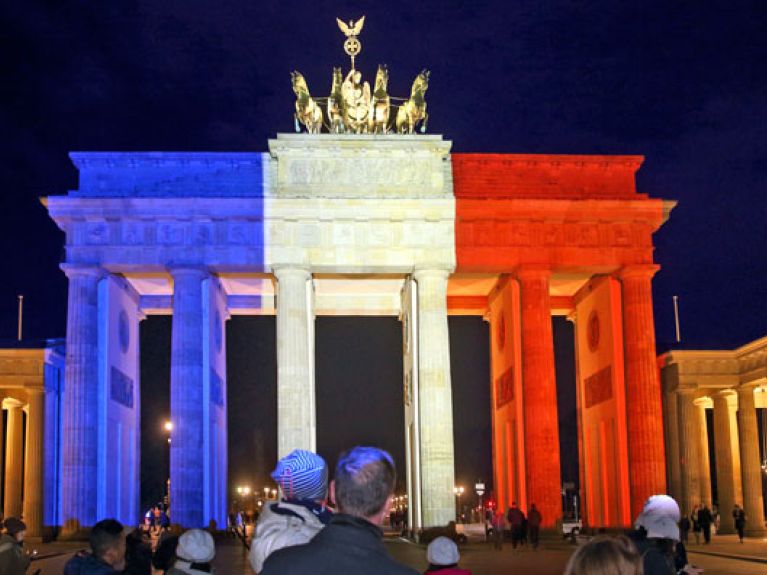“I was very concerned”
Federal Foreign Minister Frank-Walter Steinmeier experienced the attacks in Paris one year ago very close up. He remembers in an interview.

Berlin (dpa) - It was one of those moments you never forget: Federal Foreign Minister Frank-Walter Steinmeier was there when the series of attacks began on the evening of 13 November 2015. Together with France’s President François Hollande, he was sitting in Stade de France to watch the international soccer match between France and Germany.
dpa: You were sitting next to the French president in the VIP stand. Did you immediately think of a terror attack when you heard the explosions?
Frank-Walter Steinmeier: When those two very loud bangs went off in the middle of the first half, initially I felt like everyone else in the stadium: I had no idea what had really happened. My first thought was that fireworks had been set off by irresponsible fans.
When and how did you find out about the attacks?
Roughly quarter of an hour before half time a French security official came to President Hollande and informed us that there had probably been more than one explosion in front of the stadium. A few minutes later he came back and reported there had been deaths. That was a shock. Of course, we asked ourselves: shouldn’t we stop the match? But, following consultations during half time, it was decided to let the match continue to not cause a panic. President Hollande left the stadium to lead the crisis team. We were asked to return to the VIP stand so that the spectators wouldn’t become worried.
How did you feel at that moment?
I sat in the stand, and thousands of thoughts went through my head, very certainly nothing to do with football. It was a terrible feeling, also because more and more information arrived about the other attacks in the city. Nevertheless, it was important to keep calm in order not to trigger a panic.
Did you fear for your life?
No, but obviously I was very concerned – for the people in the stadium and in the city. My greatest fear was that news of the attacks would spread and panic would break out in the stadium. But the police did a great job. Thanks to them it was possible to clear the stadium after the match without any dead or injured.
At that time there was talk of a 9/11 for Europe. Looking back after a year, would you see it that way today?
Such terrible events cannot be compared. It is clear: these attacks were an assault on Europe as a whole – on our way of life, our culture, our values. The Americans probably also had this feeling after 9/11.
There have also been bad terror attacks in Europe before: in London, Madrid and on the Charlie Hebdo editorial offices in Paris. Why was the shock even greater than it was after the earlier attacks?
The other terror attacks, every single one of them, were a shock too. The attacks of 13 November appeared especially cruelly coordinated and ruthlessly executed. You had to have the feeling that the ISIS terror gang had now arrived in the heart of Europe. Don’t forget: we had witnessed the advance of ISIS in Iraq and then Syria from summer 2014. The extreme brutality of this gang of terrorists had brought immense suffering upon people in these two countries. And that had now also come to us in Europe.
The Federal Government responded in a similar way to after 9/11: unequivocal solidarity – then with the USA, this time with France. At the beginning of 2002 the Bundeswehr was sent to Afghanistan; one year ago, it entered the struggle against IS (other name: ISIS) in Syria and Iraq in response to the attacks in Paris. Would this decision have been taken otherwise?
On 13 November not only Paris was struck, but the whole of Europe, Germany too, us too. Our solidarity with France was never in doubt at this difficult time. I even tweeted that spontaneously on the flight from Paris to Vienna – immediately after the match on my way to the Syria conference there. But, even before this attack, everyone was aware that ISIS cannot be defeated without military means. The international community had already joined together in an anti-ISIS coalition on the fringes of the UN General Assembly in autumn 2014. And previously, in August 2014, we had already taken the difficult decision to provide not only humanitarian aid, but also military equipment and training to the peshmerga. That was – and still is from today’s perspective – the right decision. But, of course, it will not be possible to defeat terrorism by military means alone. What we need is prospects for the people and stability in the Middle East.
Has the threat of terror now also become normal in Germany?
In Germany we do not live on an Island of the Blessed. Terror is an international threat; this danger affects us too. Absolute security does not exist, but our security agencies do everything they can to minimise the danger. Not only the prevented, but also the unprevented attacks show that we need close cooperation between our European security agencies. We are continuing to advance that.
Security precautions in Germany are still moderate in comparison to France and Belgium. The governments in Paris and Brussels do not have any problem with protecting airports and tourist attractions with heavily armed soldiers. Will that also happen in Germany after a major terror attack?
In our country, too, the security agencies are very vigilant. But we will not allow treacherous murderers to destroy our “way of life”. We must assess the dangers and risks realistically. However, there is no point in living in constant fear. We do everything we can to give our security agencies access to the right instruments to prevent terror attacks as far as it is possible.
Source: dpa; translation: FSM

